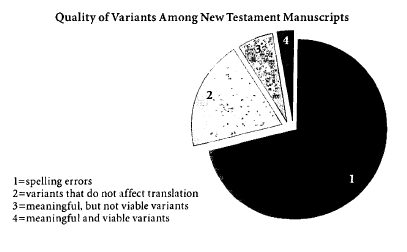We have discussed textual criticism a few times in the past months. Here is an excerpt from an interview Dr. Dan Wallace did (he is a leading textual critic). You can read the whole article here at Justin Taylor's blog.
What are the different kinds of variants, and how do they affect the meaning of the texts?
The variants can be categorized into four kinds:
- Spelling and nonsense readings
- Changes that can’t be translated; synonyms
- Meaningful variants that are not viable
- Meaningful and viable variants

Let me briefly explain each of these.
Spelling and nonsense readings are the vast majority, accounting for at least 75% of all variants. The most common variant is what’s called a movable nu—that’s an ‘n’ at the end of one word before another word that starts with a vowel. We see the same principle in English with the indefinite article: ‘a book,’ ‘an apple.’ These spelling differences are easy for scholars to detect. They really affect nothing.
The second largest group, changes that can’t be translated and synonyms, also do not affect the meaning of the text. Frequently, the word order in the Greek text is changed from manuscript to manuscript. Yet the word order in Greek is very flexible. For the most part, the only difference is one of emphasis, not meaning.
The third group is meaningful variants that are not viable. By ‘viable’ I mean a variant that can make a good case for reflecting the wording of the original text. This, the third largest group, even though it involves meaningful variants, has no credibility. For example, in Luke 6:22, the ESV reads, “Blessed are you when people hate you and when they exclude you and revile you and spurn your name as evil, on account of the Son of Man!” But one manuscript from the 10th/11th century (codex 2882) lacks the words “on account of the Son of Man.” That’s a very meaningful variant since it seems to say that a person is blessed when he is persecuted, regardless of his allegiance to Christ. Yet it is only in one manuscript, and a relatively late one at that. It has no chance of reflecting the wording of the original text, since all the other manuscripts are against it, including quite a few that are much, much earlier.
The smallest category by far is the last category: meaningful and viable variants. These comprise less than 1% of all textual variants. Yet, even here, no cardinal belief is at stake. These variants do affect what a particular passage teaches, and thus what the Bible says in that place, but they do not jeopardize essential beliefs.

No comments:
Post a Comment